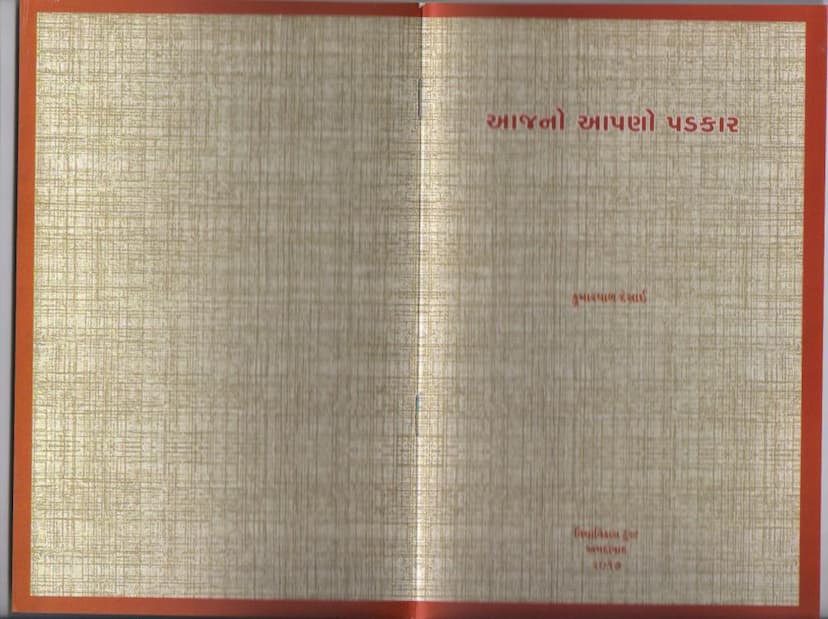Aajno Aapno Padkar
Added to library: September 1, 2025

Summary
This document is an extensive collection of speeches and biographical information related to Kumarpal Desai, a prominent Gujarati writer, journalist, and academic. The core of the provided text seems to be his acceptance speech for the Ranjitram Suvarna Chandrak (Ranjitram Gold Medal) in 2017. The entire document can be broadly summarized as follows:
Part 1: Kumarpal Desai's Personal Journey and Literary Beginnings (Pages 1-4):
- Childhood and Literary Environment: Desai begins by reminiscing about his childhood, growing up in a home filled with books and literature due to his father, Jaybhikhkhu, being a writer. He recalls interactions with eminent Gujarati literary figures like Dhumketu, Jhaverchand Meghani, Kanu Desai, Gunvantray Acharya, Duleray Karani, Pandit Sukhlalji, and Dula Bhaya Kag, highlighting their impact on him.
- Early Writing and "Zagmag": He describes his early passion for writing, starting with an anonymous story sent to the weekly magazine "Zagmag." He recounts the joy of getting his first article published and how this led to him writing a regular column called "Zagmagtu Jagat" at the tender age of eleven.
- Recognition and Gratitude: Desai expresses his deep happiness and gratitude for receiving the Ranjitram Suvarna Chandrak, acknowledging the Gujarat Sahitya Sabha and its stakeholders. He connects this award to the legacy of Ranjitram Vavabhai, a pioneer of Gujarati literature.
Part 2: A Critical Discourse on the State of the Gujarati Language and Culture (Pages 4-17):
- The Challenge of English Medium Education: A significant portion of the text is dedicated to a critique of the growing trend of English medium education in Gujarat. Desai argues that this trend is leading to a neglect of the mother tongue and a loss of cultural identity. He expresses concern that students are choosing foreign languages over their own mother tongue.
- The Lingering Influence of English: He notes that even after India's independence, the dominance of the English language and Western culture persists, leading to a blind imitation of Western lifestyles, food, and festivals. He laments the loss of traditional values and practices.
- The Importance of Mother Tongue: Desai strongly advocates for the preservation and promotion of the mother tongue, citing the example of Hebrew among Jews and the national pride fostered by mother tongues in countries like Norway, Israel, and Sweden. He believes that the mother tongue is crucial for intellectual and emotional development, national unity, and preserving cultural heritage.
- Critique of Modern Education and Media: He criticizes the current education system for prioritizing rote learning and external achievements over creativity and critical thinking. He also expresses concern about the negative impact of mass media, particularly television, on cultural values, sensitivity, and the appreciation of literature.
- The Role of Literature and Art: Desai emphasizes that literature and art play a vital role in shaping the inner self and moral values of a society. He laments the decline in creative output and the rise of superficial content driven by commercial interests. He calls for a renewed focus on meaningful literature that can connect with the human spirit.
- The Role of Critics and Researchers: He highlights the importance of literary critics in analyzing and promoting new literary trends and of researchers in preserving valuable literary heritage. He also points out the neglect of tribal literature and the need for more comprehensive efforts to preserve folk literature.
- The Need for Gujarati Literature to Embrace Technology and Global Trends: Desai suggests that Gujarati literature needs to adapt to the digital age, leveraging technology to preserve manuscripts, disseminate literature, and engage with a wider audience. He also stresses the importance of translation and cross-cultural exchange.
- The Legacy of Gujarati Literary Giants: He pays homage to prominent Gujarati writers and poets like Narmad, Govardhanram Tripathi, Dalpatram, Kavi Nanalal, and Umashankar Joshi, highlighting their dedication and contributions to Gujarati literature and culture. He urges contemporary writers to draw inspiration from their commitment.
- Call for Collective Action: Desai concludes this section with a powerful appeal to all Gujaratis to actively participate in promoting and enriching the Gujarati language and literature, emphasizing that it is a collective responsibility.
Part 3: Biographical Details and Awards of Kumarpal Desai (Pages 18-31):
This extensive section provides a detailed account of Kumarpal Desai's life, career, literary works, and numerous awards and honors. It covers:
- His Family and Influences: Further elaborates on his upbringing and the literary environment.
- His Educational and Professional Career: Details his academic pursuits and his long tenure as a professor and dean.
- His Literary Contributions: Lists his vast body of work across various genres including criticism, research, biographies, children's literature, and journalistic writings. It highlights his significant contributions to Jain studies and his efforts to make Jain philosophy accessible.
- His Journalistic Career: Mentions his long-running column "Int ane Imarat" and his work in journalism.
- His Sports Journalism: Notes his early work as a sports commentator and writer, particularly on cricket.
- His Role in Various Institutions: Lists his leadership positions in literary and cultural organizations like the Gujarat Sahitya Parishad and Gujarat Vishwakosh Trust.
- His Awards and Honors: A comprehensive list of the many prestigious awards he has received from government bodies, literary academies, and international organizations, acknowledging his significant contributions to literature, education, culture, and Jain studies.
- Testimonials from Esteemed Personalities: Includes appreciative quotes from other prominent literary figures like Raghuvir Chaudhary, Chandrakant Bakshi, Chandrakant Mehta, Dhiru Parikh, and Bhalchandra Bhatt, acknowledging his versatility, dedication, and impact.
In essence, "Aajno Aapno Padkar" is a multifaceted document that combines a personal reflection on the author's literary journey with a profound and critical analysis of the challenges facing the Gujarati language and culture in the contemporary world. It serves as a testament to Kumarpal Desai's deep commitment to his mother tongue, his rich literary legacy, and his multifaceted contributions to society.